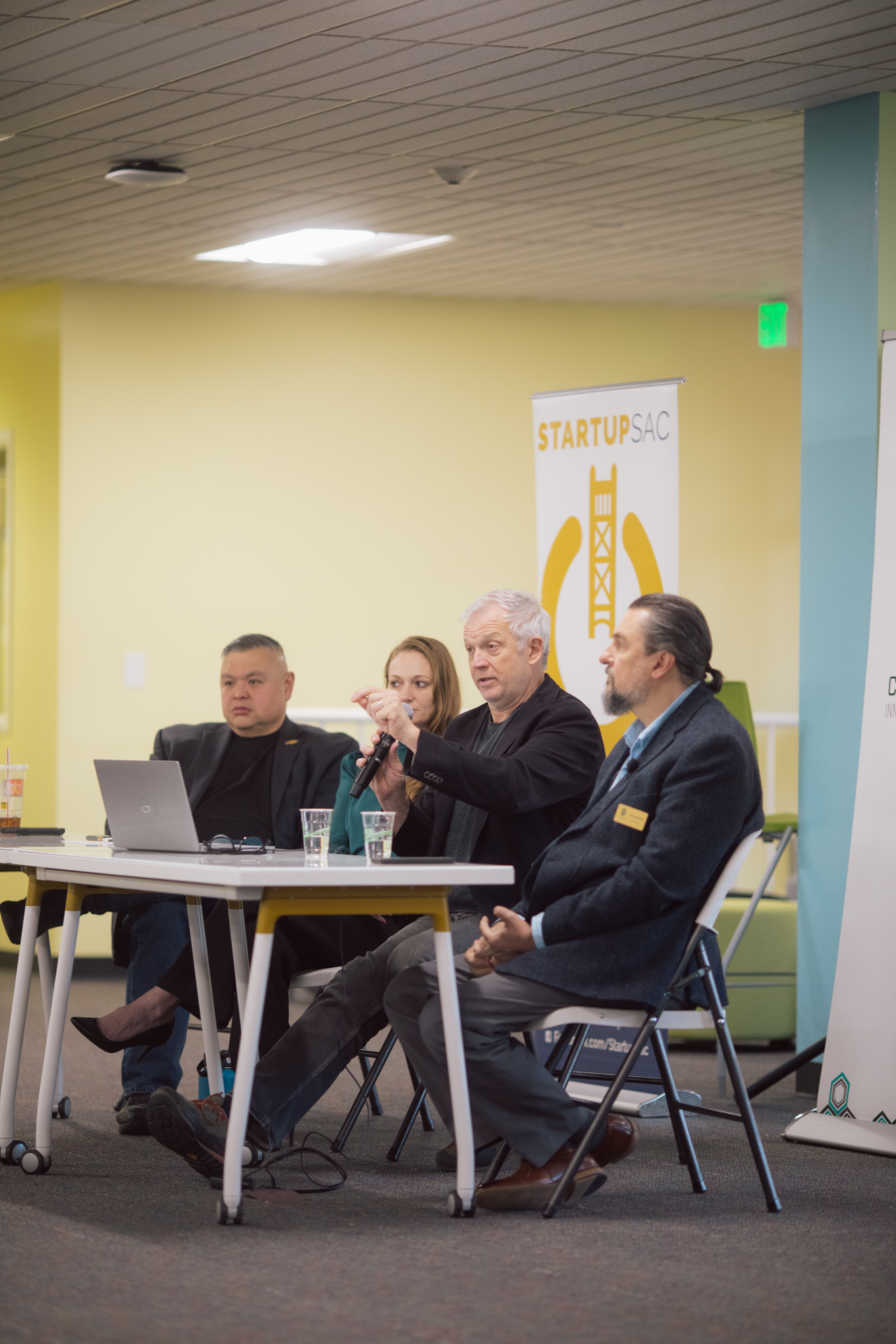
[ad_1]
March 14, 2024
A panel of synthetic intelligence consultants explored the impacts of generative AI on the economic system, schooling and society throughout a current occasion at Sacramento State geared toward highlighting the rising expertise’s transformative energy.
The Carlsen Center for Innovation and Entrepreneurship hosted the panel dialogue on March 13 in partnership with the University’s National Institute on AI in Society (NIAIS).
The occasion was a part of Sac State’s ongoing work to be a leader in advancing the use and ethical application of AI.
NIAIS head Alexander “Sasha” Sidorkin kicked off the dialogue with a presentation on points reminiscent of AI myths and the way the rising expertise will impression the schooling system.

“Some people call to stop developing AI, but it’s really a risky position because if we stop, other countries won’t,” Sidorkin mentioned. “I think it’s important to understand that with more powerful computers, artificial intelligence in our hands is better than the same thing somewhere else.”
Although some have expressed issues that AI may pose a risk to humanity, Sidorkin mentioned the expertise isn’t capable of be inherently evil, because it lacks human emotion and thought. However, he mentioned, its actions may result in destruction if not correctly managed.
“I just want to remind people that you can unplug any computer and it will stop working,” Sidorkin mentioned. “There has not been a single case documented where a computer has done something on its own volition, something humans didn’t want it to do.”
Sidorkin additionally mentioned that though there isn’t sufficient knowledge to know AI’s full impression, sure job sectors undoubtedly will likely be affected. However, AI will create new jobs and allow individuals to perform duties we presently can’t do, he mentioned.
“I’ll give you a little tip here: If there’s anything you don’t like doing because it’s boring, AI is going to do it for you,” Sidorkin mentioned. “It’s really good at boring stuff, writing letters of recommendation, drafting memos, and all of this bureaucratic stuff. Anything creative that you like to do, AI is not probably going to help you because it just doesn’t have that ability.”
A panel of AI consultants shared their ideas and answered questions from the viewers.
Sac State Philosophy Professor Matthew McCormick addressed the challenges of AI in schooling immediately, explaining that AI has made conventional class assignments tough as a result of AI chatbots can do a number of the scholars’ work. Argumentative reasoning is important in philosophical essay writing, he mentioned, however assignments are much less efficient and tougher to evaluate when chatbots can type the arguments.
“That process of paper writing, that’s gone now, at least the old school way,” McCormick mentioned. “I can bring them to the classroom and have them sit down by hand and write an essay, but that is not like the good oldfashioned college essay where you get to go home, write it and come back. So, I am worried about that, and ’m trying to deal with that, and I want to come up with some good, new clever ideas.”
The panel additionally included Heather Gold, government director of instructional packages at Gateway Community Charters, and Rich Foreman, chief expertise officer at Advertising and marketingHero and chief operations officer at IGH Naturals.
Attendees requested panelists a few vary of subjects, together with the evolution of NIAIS, how AI works, authorized points when utilizing AI-generated content material, fact-checking and accuracy of AI outputs, how to save cash whereas growing service when utilizing AI, and workforce competitors amongst those that adapt to utilizing AI and those that don’t.
One girl, who mentioned she works within the environmental subject, wished to know how you can method studying how you can use AI, as its speedy evolution can render on-line lessons and certifications outdated inside weeks. Panel members agreed the most effective method is simply to make use of it and get comfy with it, but additionally provided concepts on how you can maintain updated.
“What I’ve actually been finding that’s amazing to keep on top of things is YouTube,” Foreman mentioned. “It really is almost daily, it’s like there’s something new and you know with all these different companies coming out, and there’s just so much.”
“Some people call to stop developing AI, but it’s really a risky position because if we stop, other countries won’t. I think it’s important to understand that with more powerful computers, artificial intelligence in our hands is better than the same thing somewhere else.” — Sasha Sidorkin, head of the National Institute on Artificial Intelligence in Society
Don Button, a professor at Sacramento City College, requested how schooling would possibly evolve if college students aren’t studying the fundamentals of writing and different disciplines effectively as a result of they’re using AI chatbots. Many college students, he mentioned, already battle due partly to the passage of legislation that has made adjustments to remedial math and English coursework.
“Policies and everything are going to have to change, but it’s about how do we start to have conversations to find that balance?” Gold responded. “There is a level of skill that they need to be able to have, but there are technologies we use for students with (disabilities), and they’re allowed to have that on their assessments. So I do think that technology can aid and provide access for English-language learners and students with special needs.”
[adinserter block=”4″]
[ad_2]
Source link